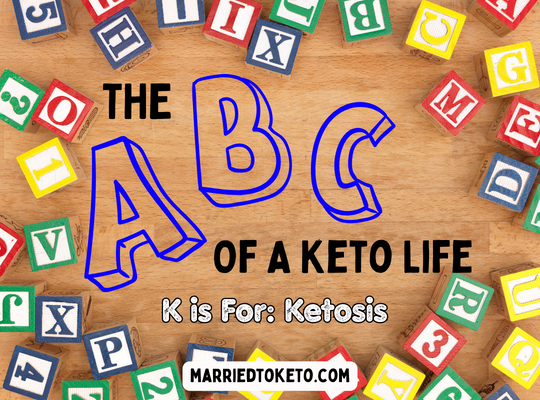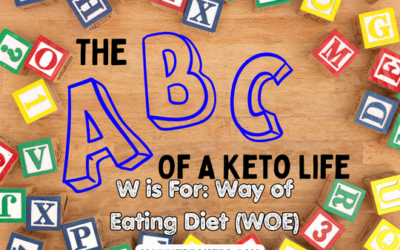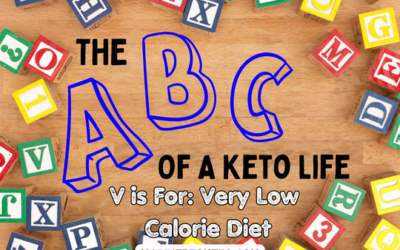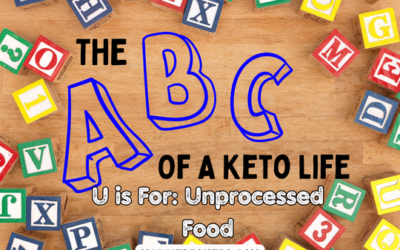What’s the first thing we learn as children? Our ABC’s. So, we thought it would be a fun idea to do the ABC’s of keto! This blog series looks at some of the main ideas and the not-so-main ideas of keto as we work our way through the alphabet. The next one in our series is: K is for ketosis.
What Is It?
Ketosis is a metabolic state when your body burns fat for energy rather than glucose. Tuesday’s blog was all about carbs on keto, and it’s important to reduce those carbs in order to get into ketosis. The Cleveland Clinic explains it as when your carb intake gets so low (i.e. under 20 grams a day) so your body can’t use glucose anymore for energy. Being resilient, our bodies turn to another source for energy – fat. This process makes ketones, which becomes our source of energy. When this happens, we are in ketosis.
Is It Related to Ketoacidosis?
It is not! Ketoacidosis happens to diabetics when their blood turns acidic. This happens when the blood has too many ketones due to a lack of insulin. While ketosis is a natural, metabolic state, ketoacidosis is life threatening and you need go immediately to a health professional.
Is It Natural?
If we look at human history, you can see that ketosis is something we have been doing naturally for centuries. About 10,000 years ago, humans started to settle in one area and cultivate the land to grow food – creating agriculture. Prior to that, we wandered the land hunting and gathering what we could find for food. This makes it likely, especially for those of us in the colder climates, that we were naturally in ketosis for at least part of the year.
In the last 150 years, the industrial era has given us access to mass grains and sugar. Refined sugar, flour, and corn are at our disposal. This has meant we rely on them for our diet. Just because some of us are now turning to a keto diet, doesn’t mean it is unnatural.

Other research declares ketosis is not natural. They say our ancestors only used ketosis for a temporary way to survive food shortages, and therefore you should not do it long-term. They also point out that other animals do not live in this permanent metabolic state. Fair enough, but animals also don’t add refined sugar to everything so I’m not sure it’s a good comparison. People do live in ketosis long-term for medical reasons and they seem to be doing okay. Bottom line, keep in touch with your doctor and keep up with any medical tests. If you feel good, keep on keeping on.
How Do You Know You Are In Ketosis?
When you first get into ketosis, there are some tell-tale signs that you may not like. You may have bad breath from the ketones. Make sure you brush your teeth after every meal, drink lots of water, and maybe carry some sugar-free gum with you. You may also initially have a hard time sleeping, lack energy, have brain fog, and have some digestion issues. This is what we call the keto flu. To avoid this as much as possible, drink lots of water, give your body lots of fat, and rest as much as you can. Don’t worry – it’s temporary.
Once your body switches over and you are in ketosis, you will start to lose weight. This can be a pretty rapid change. The first week or two will be water weight, and then you will slow down, but you will also start burning actual fat off your body. Your inches will shrink and you will need some new clothes. You will have increased focus and energy. And, best of all, you will rarely be hungry.
To know for sure if you are in ketosis, you can test. There is an increase in ketones in your blood, urine, and breath. The most reliable test is a blood test, and you can purchase the equipment online for this. You can also buy urine tests, which are a little less reliable but less invasive. The least reliable but easiest to do are the breath tests. Besides the bad breath, you can buy tests for this online as well.
What If You Can’t Get Into Ketosis?
I did a blog on a friend of mine who did great on keto, but then went back to her carb-loving ways. She wanted to get back on the keto diet. However, when she tried, she found it difficult to get into ketosis. Once you’re out, it can be more difficult to get back into that metabolic state for some. If you find you are having a hard time, there are some tips in that blog that might help you. Don’t give up – it will happen.
Wendy





